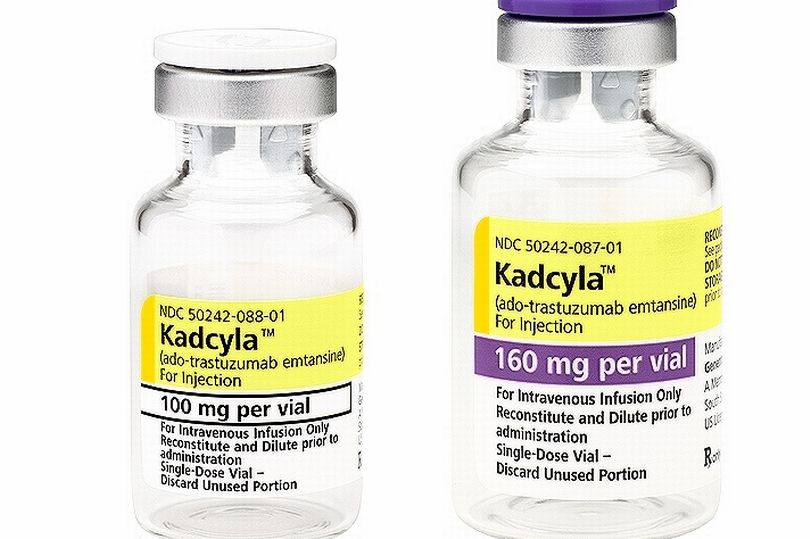Xeloda () vs Kadcyla (trastuzumab emtansine)
Xeloda () vs Kadcyla (trastuzumab emtansine)
Xeloda (capecitabine) is an oral chemotherapy medication that is metabolized into 5-fluorouracil (5-FU) in the body, primarily used to treat breast cancer and colorectal cancer by interfering with DNA production, thus slowing or stopping the growth of cancer cells. Kadcyla (trastuzumab emtansine) is a targeted therapy combining trastuzumab, a monoclonal antibody that targets the HER2 protein, with a chemotherapy agent, emtansine, and is used specifically for the treatment of HER2-positive breast cancer, where it binds to HER2-positive cancer cells and delivers the chemotherapy directly to them. The choice between Xeloda and Kadcyla would depend on the specific type and characteristics of the breast cancer, including HER2 status, previous treatments, and overall health, and should be made in consultation with an oncologist who can evaluate the individual's unique situation.
Difference between Xeloda and Kadcyla
| Metric | Xeloda () | Kadcyla (trastuzumab emtansine) |
|---|---|---|
| Generic name | Capecitabine | Ado-trastuzumab emtansine |
| Indications | Metastatic colorectal cancer, metastatic breast cancer, adjuvant treatment in colon cancer | HER2-positive metastatic breast cancer, adjuvant treatment for HER2-positive early breast cancer |
| Mechanism of action | Antimetabolite, thymidine phosphorylase activation | HER2 targeting, microtubule inhibitor |
| Brand names | Xeloda | Kadcyla |
| Administrative route | Oral | Intravenous |
| Side effects | Hand-foot syndrome, diarrhea, nausea, fatigue, cardiotoxicity | Fatigue, nausea, musculoskeletal pain, hemorrhage, hepatotoxicity |
| Contraindications | Dihydropyrimidine dehydrogenase (DPD) deficiency | History of severe hypersensitivity to trastuzumab or to any of its excipients |
| Drug class | Antimetabolite, fluoropyrimidine | Antibody-drug conjugate |
| Manufacturer | Roche | Roche |
Efficacy
Xeloda (Capecitabine) Efficacy in Breast Cancer
Xeloda, also known by its generic name capecitabine, is an oral chemotherapy medication that is used in the treatment of breast cancer. It is a prodrug that is converted into 5-fluorouracil (5-FU) in the body, which is a cytotoxic agent that interferes with DNA synthesis and cell division. Xeloda is particularly effective in the treatment of metastatic breast cancer, especially after failure of anthracycline-containing chemotherapy. Clinical trials have shown that Xeloda is effective in prolonging progression-free survival and overall survival in some patients with metastatic breast cancer. Moreover, Xeloda has also been used in combination with other drugs, such as docetaxel, to increase its efficacy against breast cancer.
Kadcyla (Trastuzumab Emtansine) Efficacy in Breast Cancer
Kadcyla, known generically as trastuzumab emtansine, is a targeted therapy drug used in the treatment of HER2-positive breast cancer. This drug is a conjugate of the monoclonal antibody trastuzumab and the chemotherapy agent DM1 (emtansine), which allows for the delivery of the cytotoxic agent directly to the cancer cells that overexpress the HER2 protein. Clinical studies have demonstrated that Kadcyla significantly improves survival outcomes in patients with HER2-positive metastatic breast cancer who have previously received trastuzumab and a taxane, separately or in combination. Kadcyla has been shown to reduce the risk of disease progression and death compared to other standard therapies.
Comparative Efficacy in Breast Cancer Treatment
When comparing the efficacy of Xeloda and Kadcyla, it is important to consider the specific subtypes of breast cancer they target. Xeloda is used for metastatic breast cancer more broadly and has shown efficacy in patients who have previously received certain types of chemotherapy. On the other hand, Kadcyla is specifically designed for HER2-positive breast cancer and is used in patients who have been previously treated with trastuzumab and taxanes. The targeted nature of Kadcyla often results in improved efficacy for the specific patient population with HER2-positive disease.
Conclusion on Efficacy
In conclusion, both Xeloda and Kadcyla have demonstrated efficacy in the treatment of breast cancer, albeit in different patient populations and disease settings. Xeloda's role as an oral chemotherapeutic is significant for patients with metastatic breast cancer, while Kadcyla's targeted approach is a critical option for those with HER2-positive metastatic breast cancer. The choice of treatment depends on various factors, including the breast cancer subtype, previous treatments, and patient-specific considerations. Ongoing research continues to refine the use of these medications to maximize their efficacy and improve outcomes for patients with breast cancer.
Regulatory Agency Approvals
Xeloda
-
European Medical Agency (EMA), European Union

-
Food and Drug Administration (FDA), USA

Kadcyla
-
European Medical Agency (EMA), European Union

-
Food and Drug Administration (FDA), USA

-
Health Canada

-
Therapeutic Goods Administration (TGA), Australia

-
Medsafe (NZ)

Access Xeloda or Kadcyla today
If Xeloda or Kadcyla are not approved or available in your country (e.g. due to supply issues), you can access them via Everyone.org.
How it works

Make an enquiry
Choose the medicine you want to buy, answer a couple of questions, and upload your prescription to speed things up. We’ll get back to you within 24 hours.


Make an enquiry
Choose the medicine you want to buy, answer a couple of questions, and upload your prescription to speed things up. We’ll get back to you within 24 hours.


Breeze through the paperwork
We'll guide you through the required documents for importing unapproved medicine, ensuring you have all the necessary information.


Get a personalized quote
We’ll prepare a quote for you, including medicine costs and any shipping, administrative, or import fees that may apply.


Receive your medicine
Accept the quote and we’ll handle the rest - sourcing and safely delivering your medicine.

Some text on this page has been automatically generated. Speak to your physician before you start a new treatment or medication.
Let's talk
If you have any questions, call us or send us a message through WhatsApp or email:
Contact us




